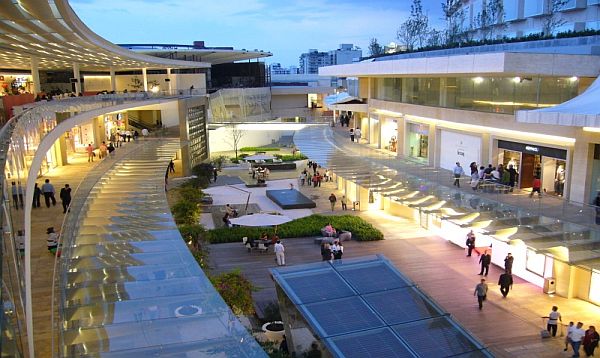While their parents may have scrimped and saved to raise small armies of children on a single paycheck, growing numbers of high-earning Mexican couples are putting the department store before the baby carriage.
Couples with dual incomes but no kids, or "Dinks," are on the rise in Mexico, nearly doubling since 2005. They are buoying a growing high-end goods market, splashing out on everything from expensive lingerie to home decor.
Though just over a million in number, the couples are a gold mine for leading brands, and their spending habits are shoring up consumer demand as Mexico's economy cools.
Sandra Rodarte, 27, an events producer who shops for Apple products and loves fine whiskies, drops at least $780USD a month on non-essentials like annual trips to the US.
She and her live-in boyfriend have no plans to raise a family, she explains while lunching at the exclusive marble-clad shopping mall, Antara, in downtown Mexico City.
"It's more fun, freer ... as a person and as a couple," said Rodarte, who is conscious that being a Dink means going against the grain in a culture that values marriage and motherhood. "Of course there are stigmas. Here in Mexico, women are supposed to leave their homes in white to get married as virgins."
Little data exists on how much Mexican Dinks spend, but a 2008 study by consulting firm De la Riva Group found that each couple shells out about $12,900 per year, largely on movies, restaurants and bars - or some $17.17 billion in total.
That infusion is helping to boost Mexico's luxury goods market, which is projected to expand 12 percent this year, on par with growth over the last four years, according to Bain & Company, a consulting firm.
By contrast, total retail sales grew 3.7 percent last year.
For luxury leather goods maker Coach, Dinks are a growing market, company president Ian Bickley said in an email.
The firm, which set up shop in Mexico a decade ago, now boasts twenty-six locations, its biggest presence in Latin America, and plans to open a new store in the city of Queretaro this year.
 |
And with good reason.
Spending on designer apparel, luxury accessories, and fine wines hit $3.88 billion in Mexico in 2012, up from $2.16 billion in 2004, according to Euromonitor, a sales tracking firm.
"We see a definite uptick in interest from brands that just a couple of years ago we never imagined ... would be calling us and saying, 'We're interested in Latin America and what can you tell us about Mexico?'" said Franco Calderon, president of Latin American Retail Connection, which helps consumer goods stores set up shop in the region.
His firm is working on plans with luxury lingerie brand Agent Provocateur to debut in Mexico through top-end department store chain Palacio de Hierro.
Dinks, a concept born in the 1980s, are still a small subset of Mexicans, making up a projected 3.4 percent of households at the end of 2012. That compares with 4.5 percent in regional peer Brazil, 14 percent in the United States and 17.6 percent in the UK.
But analysts see the number continuing to grow, thanks to powerful social changes.
Mexican women, who once were far likelier to be looking after children than becoming lawyers, accountants or doctors, are now almost as well educated as men.
In 1960, only 0.5 percent of women had a university degree. By 2010 the number had leapt to almost 16 percent - just a fraction behind their male peers.
Meanwhile, birth rates in Mexico have plunged to an estimated 2.2 babies per woman this year from 5.7 babies in 1976, according to the national statistics agency.
Unlike in Europe, where the birth rate is a low 1.6, Mexican Dinks typically postpone child bearing rather than avoid it altogether. Seven out of 10 Mexican Dinks in the De la Riva Group survey said they want to have children eventually.
One of them is Tatiana Romero, a 27-year-old licensing compliance expert at software firm The Foundry. She and her boyfriend spend about $780 to $860 a month on non-essentials, including $160 for a nice meal.
Romero, who bought a Mexico City home with her partner this month, said she hopes to have kids by age 33, but for now, she is happy to enjoy "the acquisitive power, the ability to treat ourselves" that comes with two incomes and no children.
A fan of clothing brands from H&M and Zara to Tommy Hilfiger and Hugo Boss, Romero says having a family "is something I grew up with. You dream about someday getting married and having kids."
The combination of delayed parenthood along with a dual income has encouraged more expensive tastes.
"You're talking about relatively young couples that have strong purchasing power because they work and have enough discretionary income that they can undoubtedly dedicate to decorating their homes," said Carlos Miranda, vice president of Grupo Axo, which this year brought home decor brand Crate & Barrel to Mexico from the United States.
Axo, which also operates cosmetics company Sephora and clothing label Emporio Armani, has already opened two Crate & Barrel stores in Mexico City, with plans for a third in the city of Puebla.
To be sure, some see potential headwinds over Dinks' creditworthiness and financial optimism.
"They're spending more than they can afford," said Bain & Co Partner Claudia D'Arpizio, who describes the group as "Henrys," "High Earners, Not Rich Yet."
The De la Riva study suggested that saving is not a big priority for Dinks. As a group, however, they earn more on average than all other types of households, according to a 2010 survey by the Mexican statistics office.
What is clear is that spending by the no-kids set is resilient.
Sales at department stores Palacio de Hierro and Liverpool rose about 10 percent in the first quarter from the year earlier, almost double revenue growth at supermarket chains Wal-Mart de Mexico and Soriana over the same period.
"Clearly the soft patch has had a bigger impact on Mexico's upcoming middle class and not necessarily on the wealthier segments of the economy, which continue to consume," said Will Landers, an equity portfolio manager at BlackRock.


